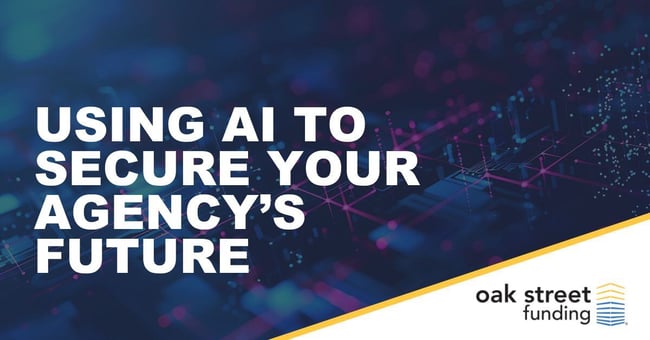
In today’s competitive insurance market, successful agency owners like you understand that efficiency is key. Manual tasks can slow you down and long processing times can leave your clients feeling frustrated. And if you’re unable to meet their needs quick enough, they’re likely to move on to your competitors. Artificial intelligence (AI) poses a powerful solution, streamlining operations and improving customer experience overall. In fact, KPMG reports that 73% of insurance CEOs say that generative AI is the most important investment opportunity for their organizations. But with a wide array of solutions like GenAI available, where do you begin?
Identifying what you’ll use AI for
Before you start diving into different AI and machine learning tools, take a step back. Ask yourself, “What areas of my agency can benefit most from AI’s capabilities?” Consider the most common uses the National Association of Insurance Commissioners (NAIC) has observed recently:
-
- Handling paperwork – One of the simplest ways AI is revolutionizing agencies is by automating paperwork. AI can capture meeting notes, reconcile bank statements, and transcribe calls, freeing up time to work directly with clients.
- Improving claims processing to detect fraud – With AI, policy holders can upload photos of vehicle damage and receive a virtual damage assessment along with repair estimates. AI systems that use computer vision to track driving styles and record accidents can reduce fraudulent claims.
- Customer service – GenAI chatbots are becoming a popular way for many agencies to better support customers. These virtual assistants are available 24/7 and can handle most basic questions a customer might have while actual customer service teams of people help with the more complex concerns.
- Training – Some agencies are using AI to develop training modules in an effort to bridge the gap in the pace behind the process that turns professionals from advisors to producers. These modules put advisors in real-life situations where they role-play and learn to discuss risks in depth, going beyond just describing available insurance products and becoming comfortable engaging more effectively with potential customers.
- Facilitating communication across languages – Agencies can serve clients who speak one of the many hundreds of languages spoken around the world thanks to AI.
AI risks to look out for
Once you’ve established what you want to use AI for in your agency, you’ll need to plan for how it’ll be implemented. Although the technology itself can be used to measure your clients’ risks, there are risks associated with it. In the most recent KPMG survey of insurance agency CEOs, 85% of CEOs agree that generative AI is a “double-edged sword” in that it may help detect cyber-attacks, but also provide new attack strategies for perpetrators.
Caution with Chatbots
Numerous studies, including a recent DEF CON red teaming hacking conference, have shown that chatbots can produce unwanted and sometimes erroneous answers depending on how questions are posed to them. Often, these problems occur because chatbots are taught to be agreeable and go along with the questioner without sufficient pushback. In the wrong hands, however, a chatbot’s agreeableness can be used intentionally to create false information or hate speech.
A Caveat: Guidelines are Necessary
To mitigate these risks, your agency should have control procedures for data collection, storage, and usage. The NAIC’s model bulletin on AI is good source. It outlines staying compliant, AI program guidelines, and regulatory oversight issues. But in general, forming a cross-functional team of IT specialists, customer service agents, and legal counsel when introducing AI to your agency for the first time can set you up for success.
Investing in AI
The insurance industry is evolving rapidly, and agencies are adapting to stay ahead. By strategically implementing AI solutions, you can streamline processes, improve customer experience, and ultimately drive profitability. While there are potential risks associated with AI, these can be mitigated by careful planning and a commitment to ethical data practices. Additionally, adopting this type of technology can be expensive and often requires significant investment at first.
High Returns
But don’t let upfront costs deter you, AI tends to be associated with a high return. According to the KPMG survey, one of the biggest advantages of using AI for insurance CEOs was to increase profitability (21%). Additionally, 58% expect to see ROI within 3 to 5 years, and a further 27% expect to see ROI in just less than 3 years.
To make the most of investing in AI, follow these simple next steps:
-
- Start with a clear strategy: As we mentioned earlier in this article, identify specific areas where AI can have the most impact on your day-to-day operations and client experience
- Prioritize data quality and security: Ensure your data infrastructure is robust and compliant with industry regulations.
- Foster a culture of innovation: Prepare your team for change and provide necessary training to work efficiently with AI tools. This might involve hiring IT-focused employees or using some working capital.
- Monitor and measure: Regularly assess the impact of AI on your operations and be ready to adjust your approach as needed.
- Stay informed: Keep up with AI advancements in insurance to be aware of new threats to your agency.
Remember, the goal of implementing AI is not to replace human expertise but to enhance it. By embracing and investing in it, you're not just making an investment in technology—you're securing the future of your agency.





/Resources%20Thumbnails%20(75).png?width=600&height=314&name=Resources%20Thumbnails%20(75).png)